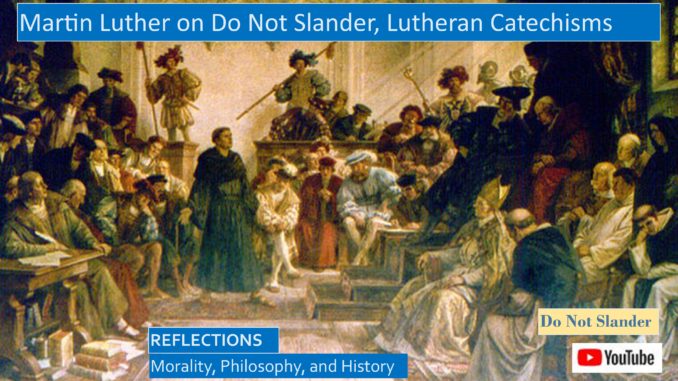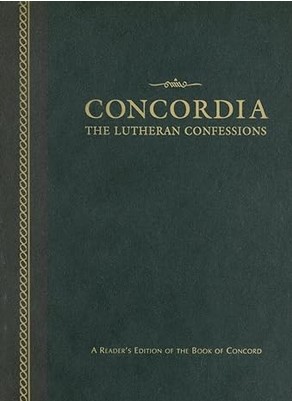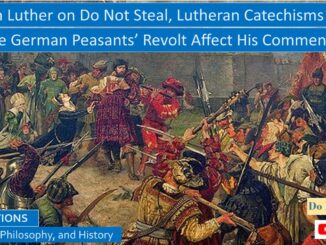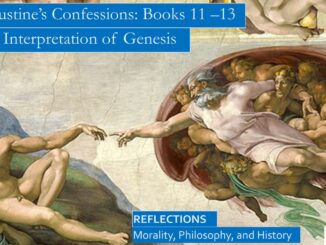
Luther is proof that the Holy Spirit can inspire those among us who are imperfect vessels for God’s grace. Luther can be absolutely lucid in his observations, and his strong wit and sharp tongue can lead to memorable teachings, but sometimes this sharpness leads him to say some rather ungodly things. Unlike the Church Fathers, you are forced to read Luther critically, and this is true in his commentary on the commandment, Do Not Bear False Witness Against Your Neighbor. But in his comments on this commandment we can learn much even when Luther heads down the wrong path.
Luther’s Small Catechism has a brilliant summary of the meaning of this commandment, “We should fear and love God, so we do not tell lies about our neighbor, nor betray, slander, or defame him, but we should apologize for him, speak well of him, and interpret charitably all that he does.”[1]
Please see the YouTube video https://youtu.be/jM2FrvyKsbk
YouTube script with book links: https://www.slideshare.net/BruceStrom1/martin-luther-do-not-slander-lutheran-catechisms
Many of the Church Fathers teach us that instead of making excuses for ourselves and judging our neighbor harshly, we should instead make excuses for our neighbor and judge ourselves harshly. But who does that?
St Ephrem does this succinctly in his short prayer, emphasizing that thinking and speaking well of your neighbor comes out of living a godly life in all respects:
O Lord and Master of my life,
Grant me not a spirit of sloth,
despondency, love of power, and idle talk.
But give to me, your servant,
A spirit of sober-mindedness, humility, patience, and love.
Yes, O Lord and King,
Grant me to see my own faults and not to judge my brother,
Since you are blessed to the ages of ages.[2]
Luther starts his Large Catechism commentary on this commandment memorably, “Besides our own body, our wife or husband, and our temporal property, we have one more treasure which is indispensable to us, namely, our honor and good name, for it is intolerable to live among men in public disgrace and contempt.” Our reputation is our most precious possession, more important than baubles and gold, every man wants “to maintain his self-respect before his wife, children, servants, and neighbors.”
This commandment demands that justice should be administered equitably for all, for both rich and poor, and should be blind to all influence, looking only at the evidence presented. “A judge should be a man of integrity, not only upright but also a wise, sagacious, brave, and fearless man. Likewise, a witness should be both fearless and upright.” “Everyone should help his neighbor maintain his rights.”
This commandment also “forbids all sins of the tongue by which we may injure or offend our neighbor.” Luther uses his quick wit like a two-by-four to beat up on the backbiters who, “learning a bit of gossip about someone else, spread it into every corner, relishing and delighting in it like pigs that roll in the mud and root around in the mud with their snouts.”
Positively stated, we not only should avoid telling falsehoods about our neighbor, we are exhorted to protect our neighbor’s reputation, even when our neighbor makes this defense difficult. Luther states this memorably, “nobody has the right to judge and reprove his neighbor publicly, even when he has seen a sin committed, unless he has been authorized to judge and reprove.”
Luther continues, “There is a great difference between judging sin and have knowledge of sin. Knowledge of sin does not give you the right to judge it. I may see and hear that my neighbor sins, but to make him the talk of the town is not my business. If I interfere and pass sentence on him, I fall into a greater sin than his. When you become aware of a sin, simply make your ears a tomb and bury it.” “God forbids you to speak evil about your neighbor even when he is guilty.”
When our neighbor has seriously wronged us, do we complain? Should we seek justice? How should we seek justice? Luther reminds us that the Gospel of Matthew gives us a protocol for settling disputes:
“If another member of the church sins against you, go and point out the fault when the two of you are alone. If the member listens to you, you have regained that one. But if you are not listened to, take one or two others along with you, so that every word may be confirmed by the evidence of two or three witnesses. If the member refuses to listen to them, tell it to the church; and if the offender refuses to listen even to the church, let such a one be to you as a Gentile and a tax collector.”[3]
We no longer have a pagan court system so nobody airs their private disputes in church. But salvation is something more than our complaints, our salvation comes from improving our relationships with our neighbor, not allowing our complaints deteriorate into harmful gossip and slander, which is poisonous rather than helpful. But confronting our nasty neighbor, why, he might get upset, or confrontational, or even violent, or we might even learn that we are wrong!
FOLLOWING THIS COMMANDMENT IN OUR DAILY LIVES
Just as we should not lie or slander or gossip about our neighbor, so we should not listen to those who lie or slander or gossip and ruin our neighbor’s reputation. We must go further, “if you encounter somebody with a worthless tongue who gossips and slanders someone, rebuke him straight to his face and make him blush for shame.” Why should we rebuke the slanderer? Why not just slink away and ignore them? You may “silence someone who would bring some poor man into disgrace, from which he cannot clear himself. Honor and a good name are easily taken away, but not easily restored.”
What do you do at work when you have to work with someone who can be really difficult to work with and everybody at work knows it, and everyone is tempted to complain? This is not technically gossip or slander, because everyone knows they are difficult to work with, but it is at least a type of soft slander, because constant complaints like this over a long period of time can be very damaging both the person’s reputation but can also ratchet up the meanness and cruelty of the office chatter.
You can try to lighten up the chatter a bit, telling your coworkers that they should be grateful, for if the company puts up with them they surely will put up with you. Or you can point out that you really do not know what difficulties they have or had to face in their personal life. If the difficult person is a lady you may be in luck, you can go to YouTube and see if someone has sung a song about someone with her name, and you can email them a link to something like the Angie song.[4]
How should we protect our neighbor’s reputation? Luther suggests that “we should use our tongue to speak good of everyone, to cover up our neighbor’s sins and infirmities, to overlook them, and to cloak and veil them with our own honor.” This is how we should treat our neighbor because that is how we would wish to be treated. It is a “noble virtue to always put the best construction on what we hear about our neighbor, as long as it is not a notorious evil, and to defend him against the poisonous tongues of those who are busy wherever they can pry out and pounce on something to criticize their neighbor, twisting everything around in the worst possible way.”
DO NOT SLANDER THE FAITH
The Catholic Catechism quotes from the Vatican II decree on Religious Liberty in its commentary on Do Not Bear False Witness Against Your Neighbor, or Dignitatis Humanae, which we discuss in a series of blogs. The Council Fathers teach us that we can prevent bearing false witness and slandering by always seeking truth, respecting truth, respected the true faith, respecting the right of others to seek the truth, though their search may differ from ours.
Luther makes an exception, Luther makes an exception for public sins, which allows us to criticize and question the motives of political and public figures. But then he says this allows us to “censure the pope and his teaching, which is publicly set forth in books and shouted throughout the world.”[5]
Professor Carey in his lectures on Luther points out that Luther’s criticism of the Pope went further than other criticisms of his day, he contended that the institution of the papacy itself was corrupt, often calling the papacy the whore of Babylon, and sometimes worse. What good came from this? Luther helped keep a lid on the more extreme political conflicts during his lifetime, but soon after all of Europe erupted in the Thirty Years War first between Catholics and Protestants, millions of Germans and other Europeans died. [6]
Such polemics were traded between Catholics and Protestants for centuries, until Vatican II unilaterally called a cease fire, with Pope John XXIII calling for a pastoral council with a conciliatory restatement of Catholic beliefs, avoiding the declarations of anathemas that council decrees had pronounced for millennia. But Facebook groups on both sides still devote themselves to trading polemics, the enemy would rather us argue as to who is damned and who is not than discuss love and faith and hope. These polemics and triumphalism does increase the Love of God in anyone’s heart, just as we should respect the religious liberty of everyone to worship God as they believe, so we should also respect the Church and the Church Authorities, Holy Scripture, the writings of the Church Fathers, the Pope, the Bishops, and the priests and pastors of all denominations.
Seeing this from Luther’s perspective, Luther was afraid for his life, after the Diet of Worms the Emperor declared him an outlaw and heretic, a death sentence meant he would never leave Wittenburg.
Luther also denied the Catholic doctrine of Purgatory, saying prayers for the departed were of no effect. We know Luther had an anger problem, he often cursed the Pope and accused of many unchristian things. We need to think the best of Luther, many of his writings and sermons are beneficial for our salvation, surely he is lingering in Purgatory. What a sad thought, if prayers for souls in Purgatory are effective we know the Protestants are not praying for him since they do not believe in Purgatory, and the Catholics aren’t praying for Luther either, since many would doubt he is even there. So maybe Catholics should take seriously the Vatican II admonition that they have much to learn from their separated brethren, to ensure that Luther is not stuck in Purgatory forever all by himself.
[1] Martin Luther, Ten Commandments, Small Catechism, in the Book of Concord (Philadelphia: Fortress Press, 1959), p. 343. The Small Catechism is also readily available separately.
[2] https://en.wikipedia.org/wiki/Prayer_of_Saint_Ephrem
[3] https://www.biblegateway.com/passage/?search=matthew+18%3A15-17&version=NRSVCE
[4] https://www.youtube.com/watch?v=K5_EBAzIPJM&start_radio=1&list=RDK5_EBAzIPJM&t=15
[5] Martin Luther, Ten Commandments, Large Catechism, in the Book of Concord, pp. 399-404. The Large Catechism is also readily available separately.
[6] Phillip Cary, “Luther: Gospel, Law, and Reformation,” lectures recorded by The Great Courses, (www.thegreatcourses.com, 2004).






4 Trackbacks / Pingbacks